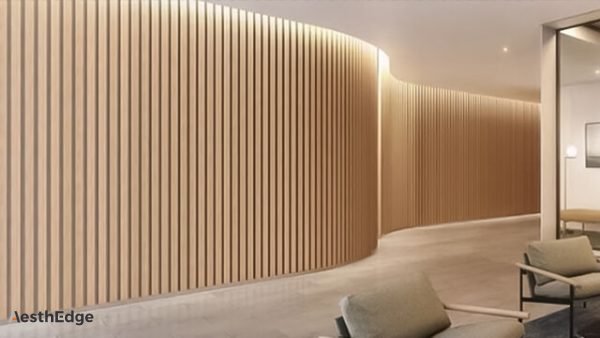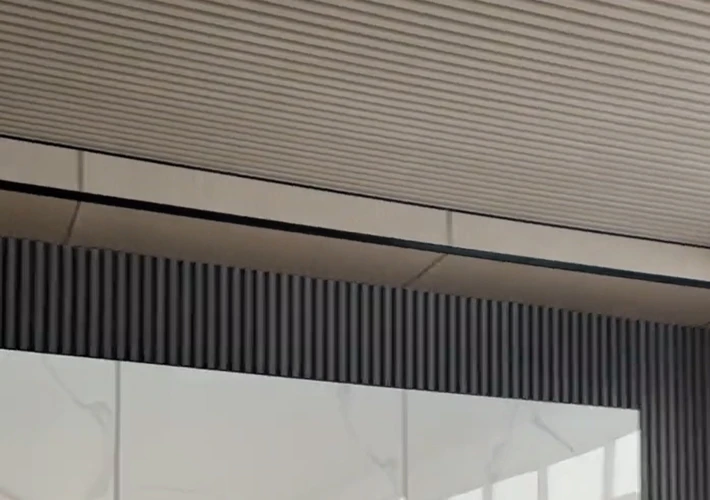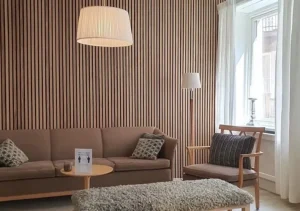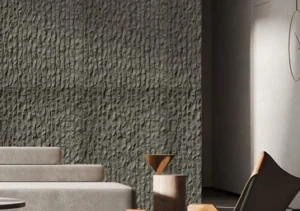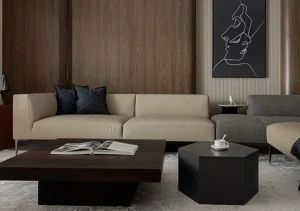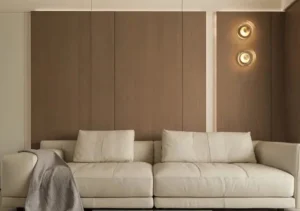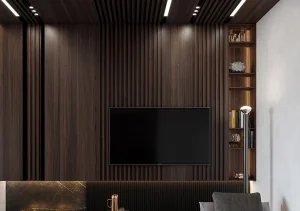Table of Contents
ToggleIntroduction
In the field of modern interior decoration, ceiling materials play a crucial role in aesthetics, durability, and functionality. With the increasing demand for eco-friendly and cost-effective building materials, WPC (Wood Plastic Composite) ceiling panels have emerged as a leading choice for both residential and commercial projects. Among the many variants available, the waterproof WPC ceiling panel stands out due to its exceptional resistance to moisture, versatility, and long service life.
This article provides a comprehensive 3000+ word analysis of waterproof WPC ceiling panels, exploring their advantages, applications, manufacturing process, environmental benefits, and market prospects. Whether you are a builder, wholesaler, designer, or project contractor, understanding the value of waterproof WPC ceiling panels can help you make informed purchasing and design decisions.
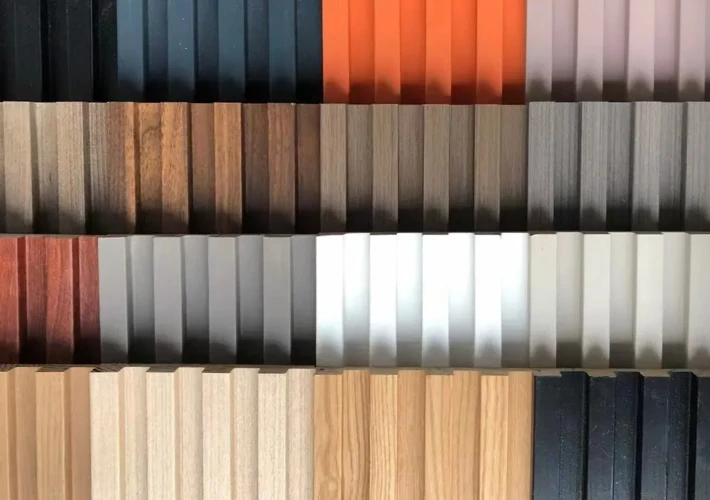
What is a Waterproof WPC Ceiling Panel?
WPC (Wood Plastic Composite) is a hybrid material that combines wood fibers or wood powder with thermoplastic polymers (such as PE, PP, or PVC) through advanced extrusion technology. This unique combination creates a ceiling material that retains the natural appearance of wood while offering the durability and low maintenance of plastic.
When manufactured with a waterproof formulation and surface treatment, WPC ceiling panels achieve excellent resistance to moisture, humidity, and water penetration, making them ideal for indoor and semi-outdoor environments where traditional wood panels might fail.
Key technical properties of waterproof WPC ceiling panels include:
- Water absorption rate: less than 0.2%
- Density: 1.2–1.35 g/cm³
- Service life: 20–30 years under normal conditions
- Fire resistance: optional B1/B2 grade based on additives
- Surface finish: wood grain, marble texture, matte, or glossy
Advantages of Waterproof WPC Ceiling Panels
1.Excellent Waterproof & Moisture Resistance
The standout advantage of waterproof WPC ceiling panels is their ability to resist swelling, warping, or decay caused by humidity or water exposure. Unlike traditional wood, WPC does not absorb moisture, making it ideal for bathrooms, kitchens, basements, and areas with high humidity.
2.Long-Lasting Durability
WPC ceiling panels are designed to withstand wear and tear, UV rays, and chemical exposure. With proper installation, they can last decades without losing their structural integrity or aesthetic appeal.
3.Low Maintenance
Unlike gypsum board or wooden ceilings that require frequent repainting or polishing, WPC ceiling panels are easy to clean with just a damp cloth. They do not attract termites or mold, further reducing maintenance costs.
4.Eco-Friendly & Sustainable
As a recyclable material made from renewable wood fibers and plastic, WPC panels are an environmentally responsible choice. Many manufacturers use recycled plastics and low-VOC additives to meet green building standards.
5.Cost-Effective Solution
Although the initial investment may be slightly higher than traditional gypsum boards, the long service life, minimal maintenance, and durability make WPC ceiling panels a more cost-effective choice in the long run.
6.Fire & Termite Resistance
WPC ceiling panels can be manufactured with fire-retardant additives, offering an additional layer of safety. At the same time, their polymer base makes them naturally termite- and insect-resistant.
7.Versatile Designs & Finishes
From wood-like textures to marble finishes, WPC ceiling panels offer a wide range of design possibilities. They can match modern, classic, or luxury interiors without the cost and maintenance issues of real wood or stone.
8.Easy Installation
The panels are designed with tongue-and-groove or click-lock systems, making installation quick and straightforward. They can be applied to new projects or used in renovation without requiring complex labor.
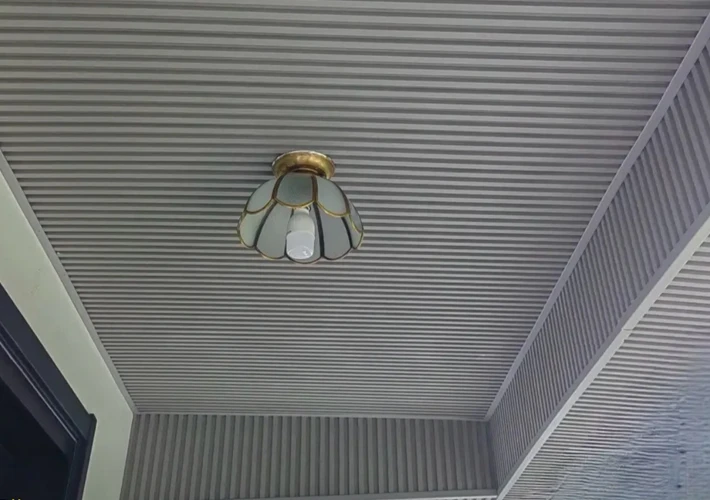
Applications of Waterproof WPC Ceiling Panels
1.Residential Projects
- Living Rooms & Bedrooms: Add warmth and a natural feel with wood grain textures.
- Kitchens & Bathrooms: Perfect for areas prone to steam and moisture.
- Basements & Attics: Prevents dampness and mold growth.
2.Commercial Spaces
- Offices & Conference Rooms: Enhance aesthetics while maintaining acoustic balance.
- Hotels & Restaurants: Provide a luxurious finish with durability and easy maintenance.
- Shopping Malls & Retail Stores: Attractive ceilings that withstand heavy traffic environments.
3.Hospitality & Leisure Facilities
- Spas & Wellness Centers: Resistant to humidity and frequent cleaning.
- Gyms & Indoor Pools: Waterproof function prevents structural damage.
- Resorts & Villas: Eco-friendly and stylish choice for high-end interiors.
4.Healthcare & Educational Institutions
- Hospitals & Clinics: Hygienic, easy-to-clean ceilings that meet strict sanitary standards.
- Schools & Libraries: Durable and cost-effective for long-term use.
5.Outdoor & Semi-Outdoor Areas
- Balconies & Patios: Resistant to rain and sunlight.
- Parking Lots & Walkways: Provide coverage with weather resistance.
Comparison: WPC vs Traditional Ceiling Materials
| Feature | WPC Ceiling Panel | Gypsum Board | Wooden Ceiling | PVC Ceiling |
|---|---|---|---|---|
| Waterproof | ✅ Excellent | ❌ Poor | ❌ Poor | ✅ Good |
| Durability | ✅ 20–30 years | ❌ 10–15 years | ❌ 8–12 years | ✅ 15–20 years |
| Maintenance | ✅ Low | ❌ High | ❌ High | ✅ Low |
| Fire Resistance | ✅ (with additives) | ✅ Good | ❌ Poor | ✅ Good |
| Eco-Friendly | ✅ Recyclable | ❌ Moderate | ✅ Renewable | ❌ Plastic-based |
| Cost | ✅ Cost-effective | ✅ Cheap | ❌ Expensive | ✅ Affordable |
From this comparison, it is clear that waterproof WPC ceiling panels offer a balanced combination of performance, aesthetics, and cost-efficiency, making them superior to traditional ceiling options in most applications.
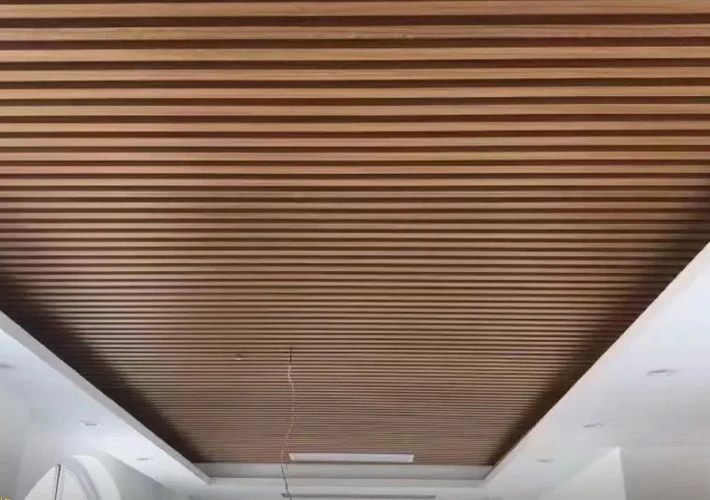
Market Trends & Global Demand
The global demand for WPC products, including ceiling panels, has been growing rapidly due to their sustainability, cost efficiency, and versatility. According to recent industry reports:
- The global WPC market is expected to exceed USD 9 billion by 2030, growing at a CAGR of around 11%.
- Asia-Pacific, especially China and India, remains the largest production hub due to abundant raw materials and competitive manufacturing costs.
- Europe and North America are key markets, with demand driven by eco-friendly building materials and modern architectural trends.
- Applications in hospitality, real estate, and commercial projects are fueling further adoption.
This growth indicates that investing in waterproof WPC ceiling panels—whether as a supplier, distributor, or contractor—is a future-proof decision.
Why Choose a Reliable China Factory for WPC Ceiling Panels?
China is currently the largest global producer and exporter of WPC ceiling panels. Partnering with a reputable Chinese factory ensures:
- Stable quality control with ISO and SGS certifications.
- Wide design range including customized wood grain, marble, and 3D textures.
- Competitive pricing due to economies of scale.
- Flexible supply capacity suitable for wholesale, bulk orders, or project-specific customization.
- Professional export service, including packaging, logistics, and documentation support.
For global importers, working with an experienced Chinese WPC manufacturer ensures both product quality and cost-effectiveness in large-scale projects.
Conclusion
Choosing waterproof WPC ceiling panels is a wise decision for modern construction and decoration projects. Their durability, waterproof properties, eco-friendliness, and versatile design options make them a superior alternative to traditional ceiling materials.
Whether applied in residential homes, commercial offices, hotels, hospitals, or outdoor spaces, waterproof WPC ceiling panels deliver long-lasting value, aesthetic appeal, and sustainable performance.
With the rising global demand and the increasing push toward eco-friendly building solutions, WPC ceiling panels are set to dominate the market in the coming years.
If you are a wholesaler, distributor, or project contractor looking for a reliable supplier, partnering with a professional WPC ceiling panel factory in China can give you a strong competitive edge in your market.

